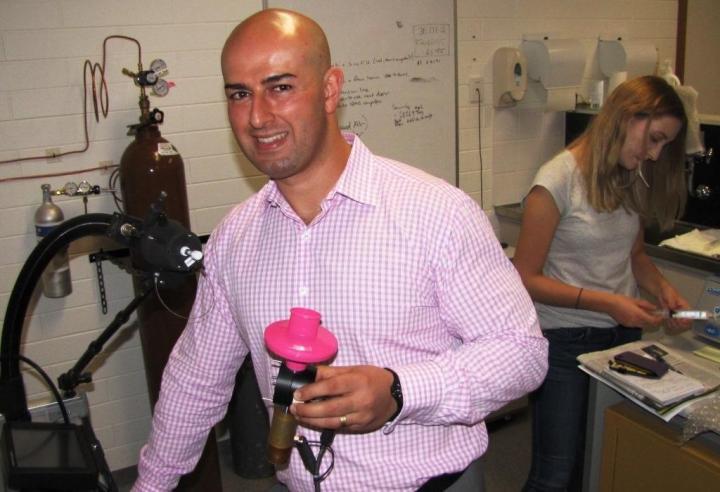Trials to analyze digestion enzyme in children’s breath

Credit: Flinders University
Small children may one day avoid invasive, painful and often traumatic oesophageal tube-testing for gut damage and coeliac disease with a new method of simply blowing into a glass tube to provide effective diagnoses.
Research published today in international journal Scientific Reports describes an exciting new breath test that could have global implications on how to detect gastrointestinal damage.
In the first study of its kind, Flinders University researchers will trial the new Dipeptidyl peptidase-4 (or ‘DPP4’) breath test in a pilot study to measure a digestive enzyme found in the small intestine and is associated with gastrointestinal damage and coeliac disease.
Lead researcher Dr Roger Yazbek says the specific DPP4 enzyme is produced in the small intestine and breaks down dietary proteins that have been associated with coeliac disease and associated gut damage.
“This breath test represents a potentially new way to non-invasively measure gut health,” says Flinders research fellow Dr Yazbek, who is looking to commence the first trials at the Women’s and Children’s Hospital in Adelaide, South Australia.
“Not only will these tests improve patient quality of life but potentially save the health care system time and money, particularly if adapted for point-of-care testing in rural and remote areas.”
Funded by the Channel 7 Children’s Research Foundation, it is one of several similar projects by Dr Yazbek and the SA Breath Analysis Research Laboratories to replace invasive endoscopic procedures with high-tech validated breath-tests to accurately test and treat various human conditions, including cancer.
In Australia, while about 400,000 endoscopic procedures are performed at a cost of almost $500,000,000, more than 14% of these procedures prove unnecessary.
The breath test could have broad translational applications, with DPP4 inhibitors also used to treat type-2 diabetes. There is emerging support for the style of ’13C isotope’ breath test for detecting changes in liver or exocrine pancreatic function, gastric emptying and even the potential to identify specific infections and an individual’s response to certain drugs.
“Some research groups have suggested that DPP4 is involved in the breakdown of gluten, and that people with coeliac disease have a reduced amount of the DPP4 enzyme along their small intestine. However, the tools to measure this in coeliac disease have not been available,” Dr Yazbek says.
“This breath test will help us to answer this question, and we are about to begin a trial at the WCH to shed some insight into this question.”
###
The new paper, ‘Development of a 13C Stable Isotope Assay for Dipeptidyl Peptidase-4 Enzyme Activity A New Breath Test for Dipeptidyl Peptidase Activity,’ by Roger Yabek, Simone Jaenisch, Michelle Squire, Catherine A Abbott, Emma Parkinson-Lawrence, Douglas A Brooks (Uni SA and Trinity College Dublin) and Ross N Butler, has been published by Scientific Reports.
Media Contact
Dr Roger Yazbek
[email protected]
Related Journal Article
http://dx.




